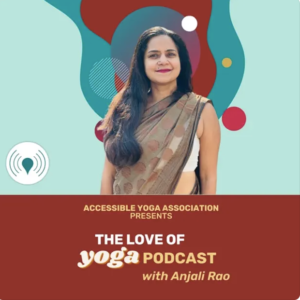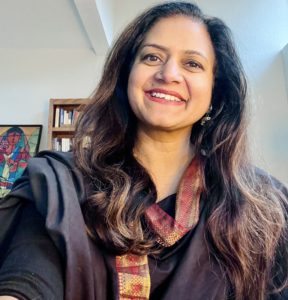
by Nina
Throughout its very long history, yoga has always been evolving. And in the much, much shorter time that yoga has been taught and practiced in the West, it has been evolving here, too. Even during my own lifetime, I’ve seen a tremendous number of changes! One recent positive change that I’m excited about is that there are a number of influential figures in the yoga world, including our guest today, Anjali Rao, who are working to make yoga more accessible to people who have been overlooked or even marginalized by the yoga community in previous decades and to spread the word about some of the very valuable aspects of yoga that also tend to be ignored by the mainstream media. So I decided to invite Anjali Rao to tell you all about some of the work she’s been doing herself and also to share some of what she knows about the work of other influential yoga teachers who she has interviewed on her podcast.
Nina: For our readers who are unfamiliar with you and your work, can you tell us a bit about yourself and your yoga background?
Anjali: I am a Yoga practitioner, first and foremost, a student of Yoga. I share insight into the Yoga stories and histories that have been obscured by heteropatriarchy and colonization. For example, I critically examine the lineages of Yoga and place them in context of the times, including the social and cultural factors that influenced the traditions and how they emerged and evolved to what we know now. I bring a multidisciplinary approach, integrating yoga philosophy and history, with storytelling, imagery, and poetry.
I am an Indian American immigrant and a cancer survivor, and I believe that a dedicated practice of yoga in all its expansiveness can alchemize and heal the world by creating ripples of change within and around us. I serve as the President of the Board of Directors of Accessible Yoga, an international nonprofit organization that aims to expand access to the teachings of Yoga to people from all backgrounds and lived experiences.
Nina: You recently started a new podcast called The Love of Yoga. Can you tell us what motivated you to start a new podcast and about what kinds of conversations you felt were missing from the yoga community?
Anjali: The Love of Yoga podcast is an offering close to my heart and is born from some of my observations and experiences in modern western Yoga. Mainstream Yoga is mostly perceived as a fitness modality for the White, young, able-bodied folks who can afford gym and studio memberships. But Yoga is a multidimensional system of teachings and practices, with a long and varied history. There is a rich legacy of folks within the Yogic traditions who have challenged systems of oppression. Yoga and social change have always been interlinked. Most folks are unaware of the depths and the breadth of the teachings.
Yoga scholarship is elitist and mostly Euro-American, and also not available to the everyday practitioner. I want to share the immense knowledge of Yoga scholars with people who are thirsty to know more. I want to uplift and highlight the work of people who are challenging systems of oppression now, in their own unique ways, to inspire all of us to be agents of change and healing in our communities of influence. The podcast is thus a weaving together of different threads of the tapestry of Yoga.
Nina: The tagline of your podcast mentions that you’re having “provocative conversations” with yoga scholars, change makers, and thought leaders. Can you tell us why you consider the conversations to be “provocative” and give some examples of episodes or discussions you’ve had that you consider particularly provocative or important?
Anjali: All the conversations are special and unique in their own way. A couple stand out, especially because we face a wave of anti-trans legislation in our country and attacks on reproductive rights. Two episodes stand out for this reason: the episode with Ash Williams, an abortion doula and community organizer and the episode with Tristan Katz and Rudraksh Chand, who speak so eloquently on the episode called The Audacity of Being, about how the mainstream Yoga community can be in a practice of ongoing solidarity with the trans community right now.
Nina: Right now there are only six episodes in the podcast. Can you tell us about your plans for future episodes and what kinds of guests you’ll be talking to this season and maybe even next season?
Anjali: Absolutely! More folks who are working on the intersections of Yoga and Justice movements are in the works. Also, I hope to share more storytelling, maybe one episode a month on one story from the great epics like Mahabharatha, and delve into topics of history, gender, caste, and religion.
Nina: Would you like to tell us about your work with Accessible Yoga? What’s your mission there and what type of work are you doing to make yoga accessible to all?
Anjali: Accessible Yoga believes that all people—regardless of ability or background—deserve equal access to yoga. We share the teachings and benefits of yoga with those who have been marginalized. We identify and remove barriers to access, build strong networks, and advocate for an accessible, equitable, and dynamic yoga culture. We now have an online space for a variety of offerings, such as workshops, discussions, and classes from teachers with varied lived experiences and expertise, for students and practitioners from all sorts of backgrounds.
I serve as the President of the Board of Directors. Our work and programming are co-created and our leadership is collective, with input from the staff and the Board that is truly diverse. I believe that this spirit of embracing and celebrating our differences is vital in the world we live in today where there is so much of polarization based on identities and ideologies.
Nina: And what about the workshops you’re teaching these days on yoga philosophy? What’s your particular focus and what kinds of students might be interested in what you’re offering?
Anjali: I will be starting a program on Yoga, Caste and Religion in September. Yoga has been shaped by and impacted many religions. There are so many misperceptions about the overlaps between Yoga and many religions. I want to unravel these relationships and encourage people to practice discernment especially now when there is so much of polarization, bigotry, and religious fundamentalism.
Jivana Heyman and I will be co-teaching a series on Yoga Philosophy in November called “The Essence of Yoga.” I so look forward to that as well.
Nina: Is there anything else you’d like to say to our readers?
Anjali: More than ever we need to learn from diverse historical narratives, learn from the mistakes of our ancestors and glean from their wisdom. History has been erased and is being erased in India and the United States, and this is dangerous for future generations. I believe that all the issues we grapple with today, be it religious fundamentalism, the environment, gun violence, racism, and transphobia, have roots in the past and antidotes in the liberatory teachings of Yoga. This work of sharing the stories from mythology or history is thus sacred to me.
You can find more information on the courses and workshops Anjali will be teaching this fall at www.yoganjali.me and https://www.accessibleyoga.org/
You can find the Love of Yoga Podcast on both Spotify and Apple, and on the Accessible Yoga website
 Anjali Rao is Yoga practitioner and an educator who offers a multi-disciplinary approach, integrating yoga philosophy and history with storytelling, imagery, and poetry.
Anjali Rao is Yoga practitioner and an educator who offers a multi-disciplinary approach, integrating yoga philosophy and history with storytelling, imagery, and poetry.
She is an Indian American immigrant and a cancer survivor, and she believes that a dedicated practice of yoga in all its expansiveness can alchemize and heal the world by creating ripples of change within and around us. She is an aspiring writer, the host of The Love of Yoga podcast, and the President of the Board of Directors of Accessible Yoga, an international nonprofit organization dedicated to sharing the teachings and benefits of yoga with those who have been marginalized. You can find out more about Anjali on her website yoganjali.me and follow her on Instagram @yoganjali.
• Follow Yoga for Healthy Aging on Facebook and follow Nina on Instagram • Order Yoga for Times of Change here and purchase the companion videos here • Order Yoga for Healthy Aging: A Guide to Lifelong Well-Being here.


Leave A Comment